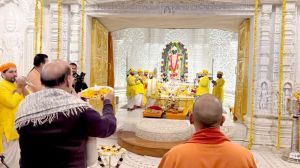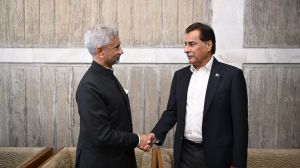There is something that creates order
Arthur I. Miller,a Professor of History and Philosophy of Science at University College,London,is fascinated by the nature of creative thinking,particularly in art and science.
READ ALL THIRD EYE STORIES
Mail to Author
Arthur I. Miller,a Professor of History and Philosophy of Science at University College,London,is fascinated by the nature of creative thinking,particularly in art and science. He authored among others. 8220;Einstein,Picasso8221;,and 8220;137: Jung,Pauli and the Pursuit of a Scientific Obsession8221;.
What does spirituality mean to you?
It means something mystical,and nothing religious. I actually used to chuckle whenever someone would pronounce the word spiritual or mystical. But then I wrote a book about the friendship and collaboration between psychologist Carl Jung and physicist Wolfgang Pauli. This changed my mind.
Along with Einstein,Niels Bohr and Werner Heisenberg,Pauli was one of the most eminent and ground-breaking physicists of the twentieth century. Usually people associate him with a dry rational mind obsessed with equations. But actually he had very different sides to him and with Jung,he explored very different grounds. Physicists typically dismiss those interests as crazy things,as part of his friendship with Jung. But they discussed those topics 8211; mysticism,alchemy,ESP,UFOs and more at the highest levels. So none of it can simply be dismissed. And in any case,there are too many unsolved problems about life and the universe,too many questions physics cannot answer,not even quantum physics. So it is important to keep our minds open to other views and explanations.
Basically,Pauli envisioned what he called a new mysticism,the emergence of a new version of science,as the confluence of many disciplines. And truly,who could have foreseen 30 years ago that science would be where it is today ? Also,many scientists have a more open mind in bringing different influences and approaches into their research. Look at things like entanglement the way particles of energy,once connected,become correlated to predictably interact with each other regardless of how far apart they are. Its applications are just starting. But deep down its about being all entangled in one field,being all one mind. And Jung believed in it too.
What is mysticism actually?
It is something you can put your hands on,like the Kabbalah for instance,or alchemical texts. It somehow actually feels more solid than spirituality.
What is your take on things like ESP or telepathy?
We are all emanating power,we are all emanating energy. It is up to us to be receptive and open to it. You can be in a room,someone is behind you and suddenly you sense it. But the brain is plastic,and a lot of our sensitivities get ruined by the information bombarding us. Things like multi-tasking are a complete illusion and really do not exist. The part of the brain that executes tasks can only do one thing at a time. So when there is a lot queuing up,a lot trying to push in,it simply creates a lot of stress. You think you are doing a lot of things at once,but actually you are stressing yourself out and you are losing the ability to focus. Which in the end jeopardizes your ability to create.
Did you have a religious upbringing?
Not at all. I went through the Bar-Mitzvah at age 13,because thats a great opportunity to get gifts. But nothing beyond that.
You mentioned being all one mind do you see us all as interconnected ? Some people see it as a divine order or a divine force 8211; is there anything as God for you?
The Judeo-Christian image of God is definitely too anthropomorphic and does nothing for me. But there certainly are strange things and odd connections. There must be something out there. Its not all a vacuum. Einstein believed in a cosmic God,not an old man with a beard. And I guess I feel the same way. I feel there is something that creates order.
For instance look at this phenomenon called emergence. Science knows about it,observes it systematically at all sorts of scales,but is still unable to explain it: systems that start out chaotic,snap into order over time. How and why? The World Wide Web is an example of that,or the phenomenon of swarming animals of similar size aggregate together and move together without any central coordination. Bees for instance suddenly congregate and move en masse together,flying as one. How do you explain it ?
Our own world can be described as system emerging out of protons,electrons etc. How does it happen is not clear.
So synchronicity as Jung understood and explained it makes sense in this context?
Definitely. Was it always meant that I would sit here talking to you ? I dont know. Life is this confluence of events. You look at all that,and youd like to think there is freewill.
Synchronicity gives you that space.
Is there any such thing as destiny or preordained events in life?
No,I dont feel that way. Things are a potential out there and they get activated. There are other ways to connect events than cause and effect. We live in a Western timeline,with rationality as the paramount tool to go through this reality,which is why we always try to explain things cause/consequence. But even in physics there is an adage that anything that you can think of,can happen. It is just that the odds of it taking place may be infinitely small. If you throw a coin in the air,the odds of it remaining there are incredibly small,but they are not nil.
What about the idea of a certain purpose to our lives we have certain tools and with them we can do something that gives meaning to our life?
Yes,of course. You try and find some meaning to what you do. You try and find a red thread. For instance for me,sharing all those ideas makes me feel good and worthwhile,especially when I interact with students.
Were you always into physics as a kid?
Not at all. I thought I would become a photographer. But in the Bronx at the time,all smart Jewish boys were going into physics. So I did.
At times of major challenges in your life,where do you find the energy?
I reach inside. And I listen to music. Or go to the gym to get it all out.
How do you look at creativity?
I look at it as something that happens in four stages. First there is a conscious thought. Then you get stuck with a problem and put everything aside. But you only put it aside consciously; the intense desire to solve it remains somewhere unconsciously. Then an illumination can occur from down there and that is how a problem gets solved.
You wrote about one of Indias greatest scientists,astrophysicist Chandrasekhar why?
I chose to write on Chandra for two reasons. I was always interested in his bitter controversy with Arthur Stanley Eddington 8212; one of the 20th century greatest scientific feuds,which hindered the progress of astrophysics for nearly forty years; and I was keen to learn more about the life of one of India8217;s greatest scientists. How was it to grow up in early 20th century India,be educated there,what were the ins and outs of his family life,his trip to England,what were his personal reflections on living in a dark,dank place,so terribly different from his warm,relaxed and sunny homeland of South India. Additionally,he had to suffer the racism that was so prominent in 1930s England. The richness of his letters and diaries allowed me to do this. By writing Empire of the Stars,I learned a great deal about life in India and the mindset of this extraordinary and complex individual who attempted to bridge two cultures.
As you are visiting this country,what is your take on India?
This was my second trip to India. I already feel a great attachment to this extraordinary place,which is so different from anywhere in Europe. My first trip was in 2003 when I was researching my book on Chandra. Since then,the scientific,technological and social transformations in India have been dramatic and inspiring. My lecture tour,sponsored by the ICCR,allowed me to witness this at first hand,and speak to some of the scientists responsible for it.
Besides,I have a particular attraction to alchemy first experienced in writing my book on Carl Jung and Wolfgang Pauli,and I find that India8217;s religious and philosophical leanings reflect it so well,in its urge to broaden one8217;s mindset,one8217;s horizons both on a rational and irrational i.e. non-logical dimension.
If you could ask God one question,what would it be?
Why conjure up a universe that was comprehensible to us,that is,that we could figure out? Was it because we would eventually realize that we had to go beyond logic in order to discover you?
If there were such a thing as rebirth,what would you choose for the next round?
Id like to believe in rebirth. I cant conceive there being nothing after this. And Id love to come back as a human being,do what Ive been doing but add some military analysis. I find it fascinating the relation between the methods of scientific and military analysis,their approach to problem solving.
What is your idea of happiness?
Its definitely more than contentment. I would think of two things: achieving excellent results in my field of work,and having a good personal life.
- 01
- 02
- 03
- 04
- 05































